Fastest Ad Blocker: 13 Best We Tested for Performance in 2023
Blocking website adverts in web browsers has been a hot topic in recent years and there are merits to both sides of the argument. Many sites out there bombard you with tons of ads, and quite often you will feel that you have no choice but to use an ad blocker because either the ads slow down the site loading too much, or they are incredibly annoying and get in the way or distract from your browsing.
On the other side, there are sites that try to inconvenience you as little as possible and be sensible with the amount of ads displayed and their placement. Blanket use of ad blockers will hurt those sites just as much as the bad sites you feel have gone overboard with their ads. It’s no secret the vast majority of websites on the internet need to use ads to help pay for running costs. Staff, hardware, fast servers, fast CDNs and the like are not free and need to be paid for.

But we cannot get away from the fact an ad blocker is probably the number one add-on for browsers like Chrome and Firefox, and will continue to be so for some time yet. Besides removing the adverts, ad blockers also save bandwidth by cutting down the amount of content a page loads, they can also help with your privacy by blocking scripts that track your browsing habits.
There’s several ad blocking extensions available for Chrome and Firefox, and some work better than others. To see what they do when when loading a web page, we’ve decided to put a number of ad blockers to the test. This test is about the performance of an ad blocker in terms of how quickly it loads a range of ad blocked pages, the maximum amount of memory it uses and how much stress it puts on the CPU.
The Ad Blockers on Test
There are many more ad blockers available in Chrome than in Firefox which is the reverse of what we expected. Here are the ones we are testing for both browsers.
Adguard– Adguard protects the user’s data by blocking third-party tracking spyware, adware, and systems. This web extension is quite popular because it can block a variety of ad formats, including video, pop-ups, floating ads, banners, texts, and interstitial ads. The software also sends periodic alerts to warn the user about phishing and malicious websites when they try to visit them. It is available for iOS, Android, Mac, and Windows devices.
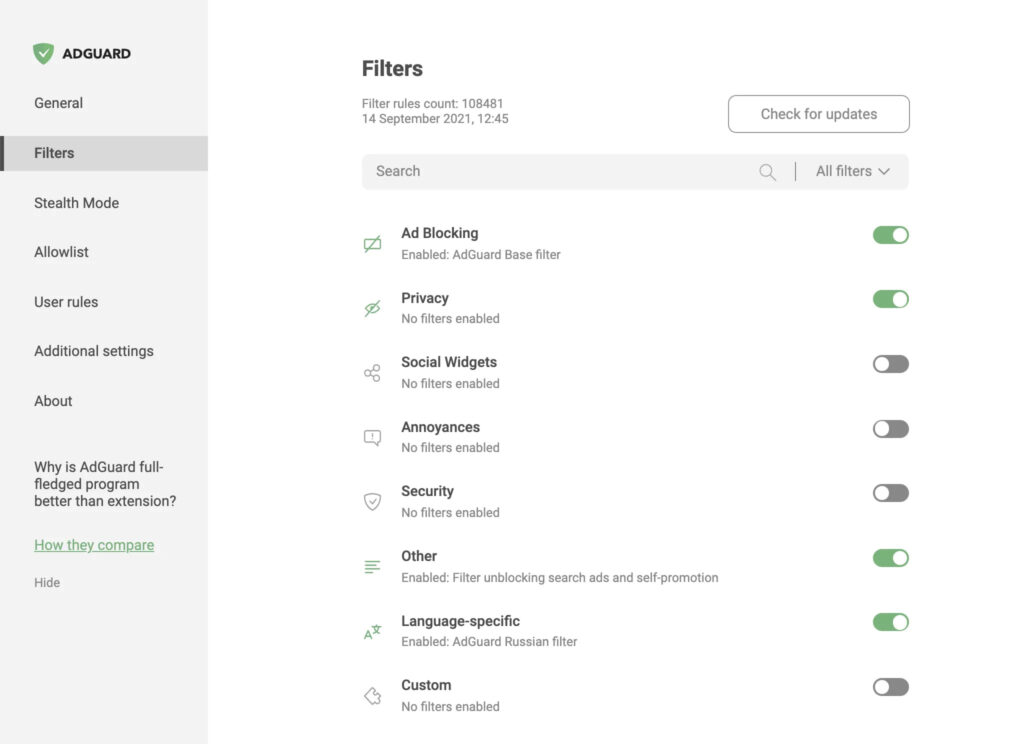
NordVPN– This ad blocker uses a DNS filtering mechanism to sieve your online traffic. The tool is designed to prevent the user from accessing hostnames and domains that are known to serve malware and ads. When using NordVPN, third parties can not track your online behavior or infect your system with malware. Furthermore, the application improves the browsing experience as ads no longer clutter the websites you visit.

Total Block– This web extension ad blocker is another accessible option on the market. With Total Block, users can take more control over their browsing experience by eliminating intrusive adverts. Furthermore, the application limits unauthorized notifications and adverts with trackers. Users also have access to a free trial and this web extension can work with Chrome, Firefox, and Internet Explorer. It is also available on iOS and Android devices.
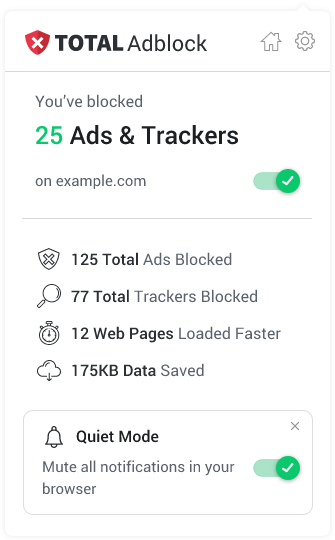
AdBlock for Chrome – The most popular ad blocker for Chrome with reportedly over 200 million downloads. There was a Firefox version released briefly but that was pulled from the Firefox add on pages for unknown reasons. AdBlock has acceptable ad options for YouTube and Google search but they are off by default.

AdBlock Plus for Chrome/AdBlock Plus for Firefox – One of the most well known ad blockers and also one of the most controversial because AdBlock Plus started off the trend of introducing acceptable ad whitelists. The AdBlock Plus website also has versions for Opera, Safari, Maxthon, Internet Explorer and even Android.
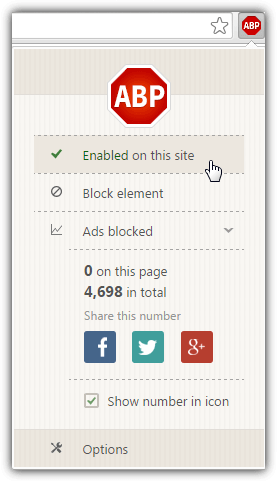
AdBlock Pro for Chrome – AdBlock Pro is based on AdBlock Plus but has a simpler options interface and no acceptable ads option. The icon button sits in the address bar instead of the normal add on area and has 3 simple options to disable, go to options or create a filter.
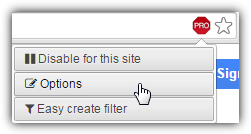
Adguard for Chrome/Adguard for Firefox – Adguard is easy to use and extra blocking scripts can easily be added. Adguard’s main product is a shareware desktop application that blocks ads in a number of browsers without the need for browser add-ons. Beta versions of both add-ons are available for testers.
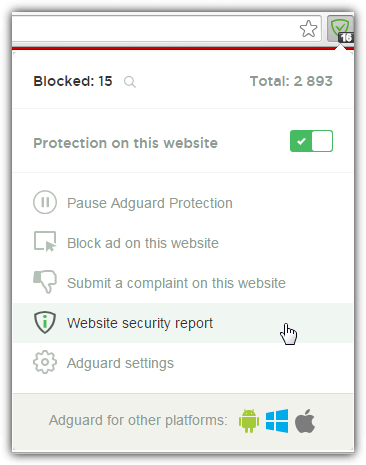
AdRemover for Chrome – AdRemover is based on AdBlock with just about the same number of options minus the support tab. On the face of it, most of the differences appear to be cosmetic and although it doesn’t ask for donations, there are social media buttons when clicking the icon.
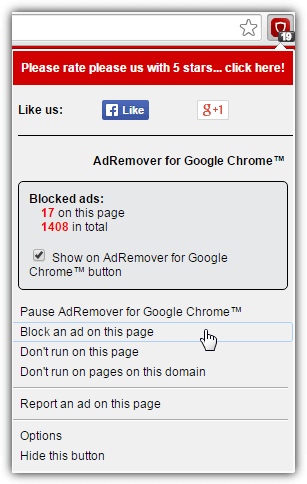
Ghostery for Chrome/Ghostery for Firefox – Ghostery can block analytic scripts, widgets, web beacons, privacy scripts and or course advertisements. The good thing about Ghostery is the ability to individually enable or disable scripts on a per site basis. Versions are available for Opera, IE, Safari and mobile operating systems.
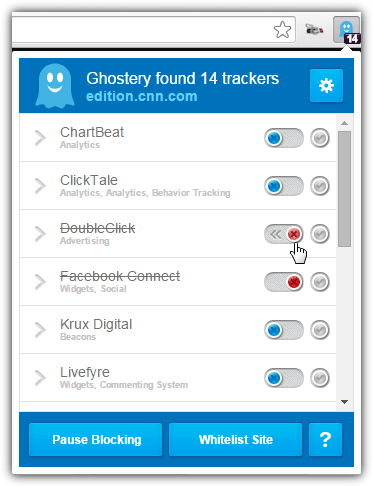
Simply Block Ads! for Chrome – This hasn’t been updated since 2014 and there’s reports that some ads aren’t being blocked, but it blocked all ads on our test sites so we included it. Simply Block Ads! (aka Simple Adblock) is the easiest to use and the only option is an opt-in to send usage statistics.
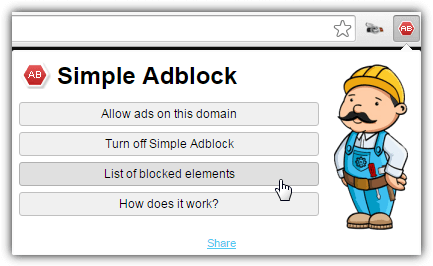
SuperBlock AdBlocker for Chrome – This is another AdBlock fork and appears to be by the same developer as AdRemover. Apart from an extra entry in the filter list and a few styling changes, we can’t see much difference between the two, perhaps there are more changes underneath.
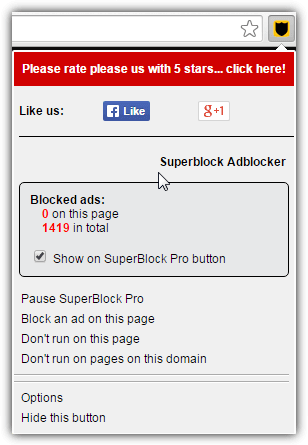
µ Adblock for Firefox – µ Adblock (Micro Adblock) is Easylist and EasyPrivacy based, and almost as easy as it gets. Simply click the icon to block/unblock specific sites. There are only 3 options including blocking social buttons. One issue is µ Adblock hasn’t been updated since January 2015.
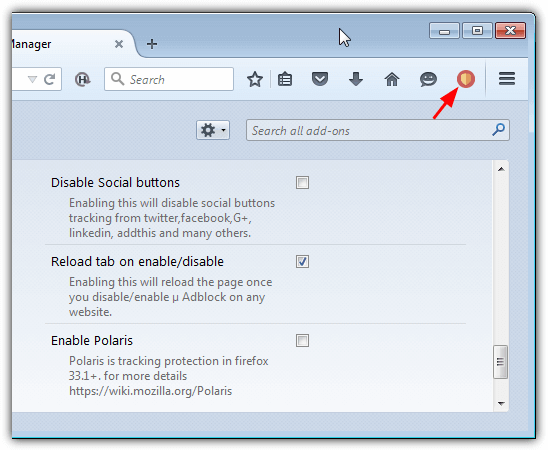
µBlock Origin for Chrome/µBlock Origin for Firefox – An up and coming ad and script blocker for both Chrome and Firefox, it also claims to be very CPU and memory efficient. A lot but not too many scripts are blocked out of the box and it’s easy to use with a number of other blocklists readily available. You can also allow or block specific sites from loading on the page via advanced mode.
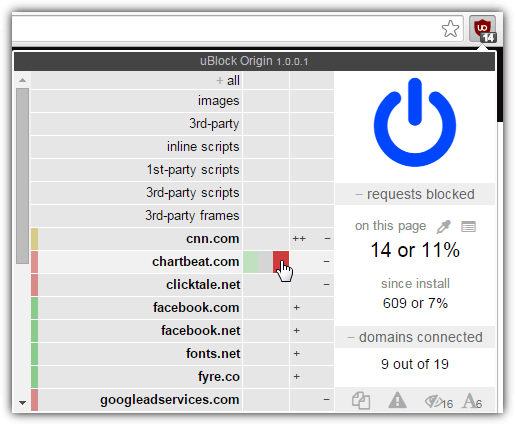
Ad Blockers not tested
AdBlock Edge (Firefox) – The project has now been discontinued and the author recommends µBlock Origin instead.
AdvertBan (Firefox) – Hasn’t been updated since 2012 and inevitably leaves most or all ads untouched.
AdBlock Lite (Chrome and Firefox) – Left a number of ads untouched on our test sites, even in the more aggressive Full mode. Various sources say the project has all but been abandoned.
AdBlock Super (Chrome) – After reading reviews and doing some testing we found that this addon actually injects ads of its own from a number of third parties. At best it’s adware, at worst it’s malware and should be avoided at all costs. Below are highlighted ads we received when visiting Amazon.com.
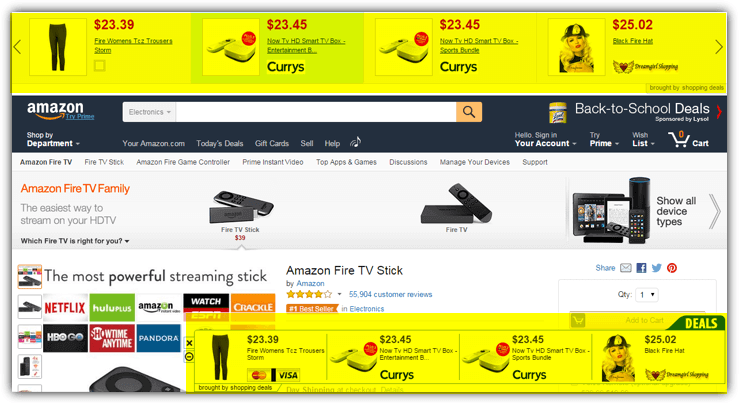
µBlock (Chrome and Firefox) – This version is essentially a clone of the original µBlock which was later renamed µBlock Origin. The author of µBlock Origin, Raymond Hill, has since disassociated himself from the µBlock branch and no longer contributes to the project. For these reasons we will test only µBlock Origin.
How We Tested the Ad Blockers
Testing websites can be tricky because ads are served by third parties so a page is depending on external servers during loading. To try and even out any inconsistencies and also any differences with other servers being used by the website, each webpage tested was refreshed 10 times in succession and any times considered abnormal were discarded and the page refreshed again. Then we looked at 3 different scores:
Google Chrome:
Page load time – An average taken for the page to load 10 times. We are using the Load event to time when the browser has finished retrieving all the resources required by the page. In Chrome this is a red score on the Network tab in Developer Tools. Caching is disabled so resources are refreshed each time.

Peak memory usage – We watched the memory usage of the ad blocker’s process in the Chrome Task Manager (Shift+Esc), the maximum amount of Megabytes used during the 10 page loads was recorded.
Peak CPU usage – Similar to memory usage, using the Chrome Task Manager the maximum percentage of CPU usage was recorded during the 10 page loads.
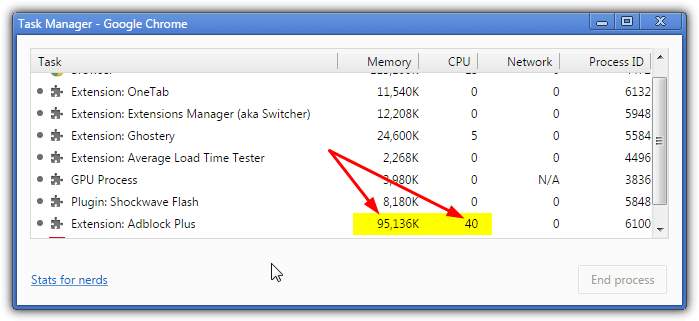
Mozilla Firefox:
Page load time – Average time taken for the page to load 10 times. Firefox doesn’t have a separate load event time in its Network tab like Chrome does, so we used an addon called app.telemetry Page Speed Monitor to get the times.
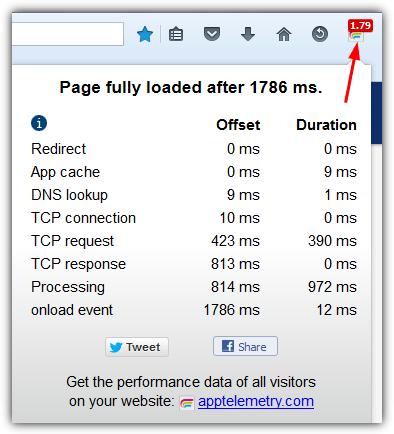
The frustrating thing about Firefox is you cannot get accurate scores for memory or CPU usage of extensions during use because unlike Chrome, everything is loaded into a single process. The about:memory page and a few related add ons don’t give a true live score for memory usage. As a result we could only record results for page load times in Firefox.
Tests were conducted on a 4GB, Core Duo 2.2Ghz laptop using WiFi and running Windows 7 as the operating system. Although the tests could have been run on a more powerful system, we believe the laptop will produce more representative scores for the average computer.
All ad blockers were installed and used with their default settings, nothing else was changed. The only exception is Ghostery which runs a wizard on startup where you need to choose what to block, for that we selected only the Advertising blocking option. Chrome 44 and Firefox 40 were the browsers used for testing.
Next we’ll test 10 websites to see how the ad blockers perform.
Tested Websites and Results
We chose 10 websites to run the tests on, they have a mixture of themes that an average or tech minded user might visit. In general we’ve picked sites that are not too fast to load all content or have a sizable load time difference between showing ads and blocking ads.
Many articles and reports have highlighted news sites as one of the worst types for advertisements, so a major provider like this should be a good starting point. CNN.com doesn’t seem too bad, we noticed 4 ads on the home page and promoted stories from outbrain inside the articles. This is a content rich site and that could affect the time differences between ads and no ads.
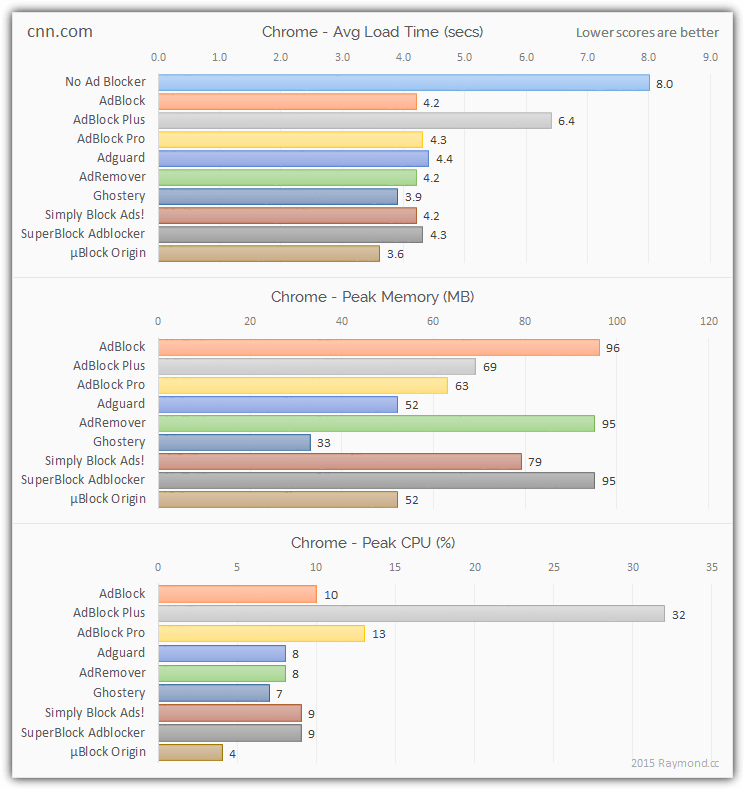
AdBlock Plus is noticeably slower while µBlock Origin and Ghostery are both a small amount quicker than the rest. Ghostery was also best in memory usage while AdBlock Plus was by far the biggest CPU hog.

The Firefox CNN load times were quite similar although µBlock Origin managed a small advantage over µ AdBlock, which had a small lead over the others.
PC Advisor is the UK branch of the American online PCWorld magazine. We originally intended to test pcworld.com but when it was found that pcadvisor.co.uk has far more and far bigger ads which can take up an astonishing 3/4 of the browser window, we switched to PC Advisor.
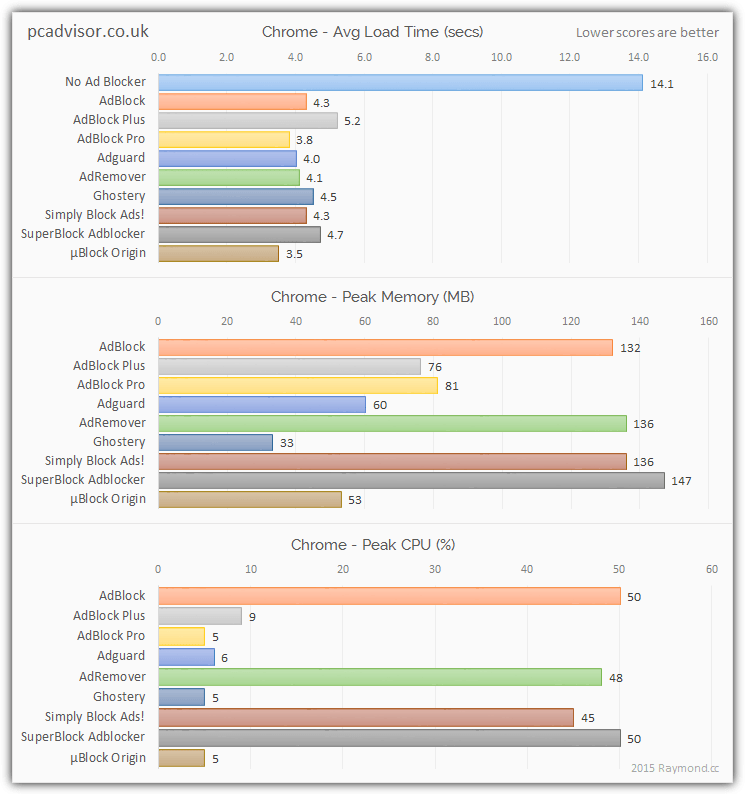
There was a reasonable time difference between the fastest (µBlock Origin) and the slowest (AdBlock Plus) in Chrome. AdBlock had CPU and memory spikes midway through the test, interestingly all the other AdBlock based addons suffered with the same problem.

Firefox didn’t like this page and often displayed 2 header ads on top of each other and was often very sluggish when loading. Things improved with an ad blocker where µBlock Origin was noticeably faster.
The Airliners name popped up a few times on the internet as somewhere with a more than reasonable amount of ads. Unsurprisingly Airliners is an aviation website with information and news about aircraft. A pop in ad periodically appears on the homepage, the search pages however, have five ads and taboola sponsored links so we tested one of those.
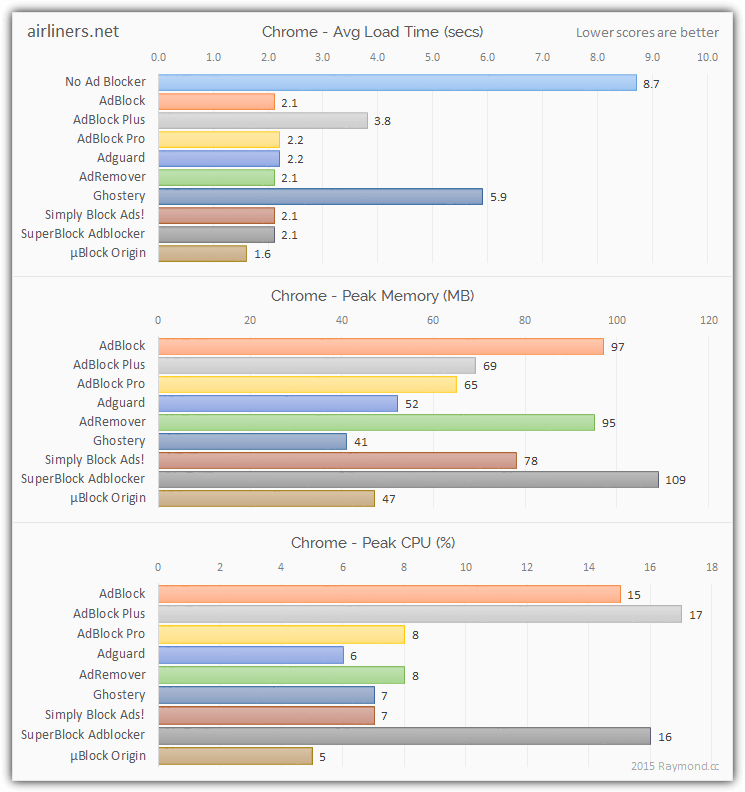
Ghostery’s load time in Chrome was the slowest and it had issues with some on page Javascript. AdBlock Plus was second slowest with µBlock Origin the fastest by half a second. µBlock Origin and Ghostery were the best on memory usage.

µBlock Origin was fastest in Firefox too, and by quite a distance. Ghostery also suffered the same problem as it did in Chrome and got stuck on one of the pieces of Javascript.
CNET is one of the biggest technology news and review sites around and the download.com subdomain is a huge portal for software downloads. CNET is one of those guilty for starting off the trend of bundling adware wrappers with their software downloads. The homepage is content rich and displays 4 ads so it’s debatable how much difference an ad blocker will make.
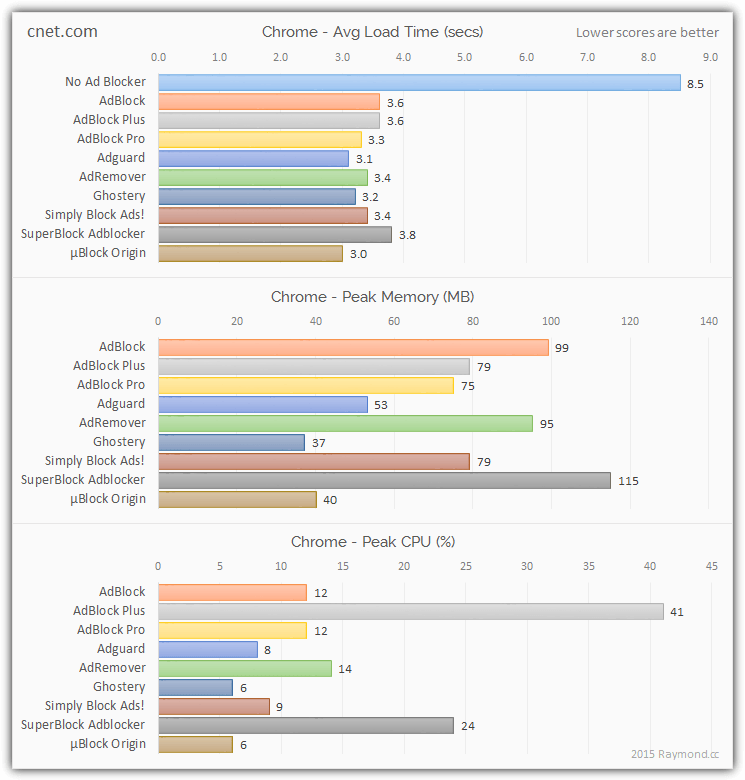
Most Chrome ad blockers were able to cut load time by more than half, with µBlock Origin eeking out a tiny lead over Adguard. AdBlock and SuperBlock were both higher on memory and processor usage.

µBlock Origin was fastest in Firefox, over a second faster than AdBlock Plus and nearly a second over Ghostery.
What makes Tmz amazing is not its entertainment news, but the sheer size and amount of content that needs to be loaded. The homepage alone requires over 600 requests, 10MB+ of data transfer and over 50 third party scripts, all of which cause high CPU usage and a slow time to completely load the page.
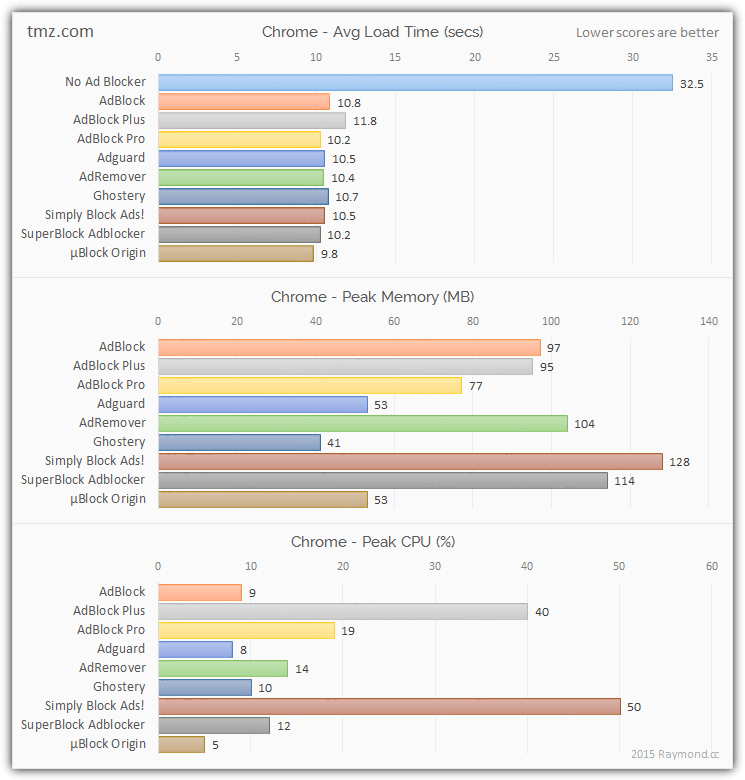
Ad blocking shaved a massive 20 seconds off load time and µBlock Origin was the only one under 10 seconds. Three blockers exceeded 100MB for memory usage while several suffered high CPU usage due to the page size, Simply Block Ads! especially.
Firefox didn’t like this page at all and we couldn’t get consistent readings to run tests, on every refresh the browser would simply not respond or crash. For this reason we’ve excluded Firefox from testing TMZ.
On first look Movie Mistakes doesn’t look that bad with 5 or 6 ads on the page and no bandwidth hogging large images or animations. The page loading slows because there’s more than 25 ad scripts downloading from various third parties, each of which takes time and slows overall progress down.
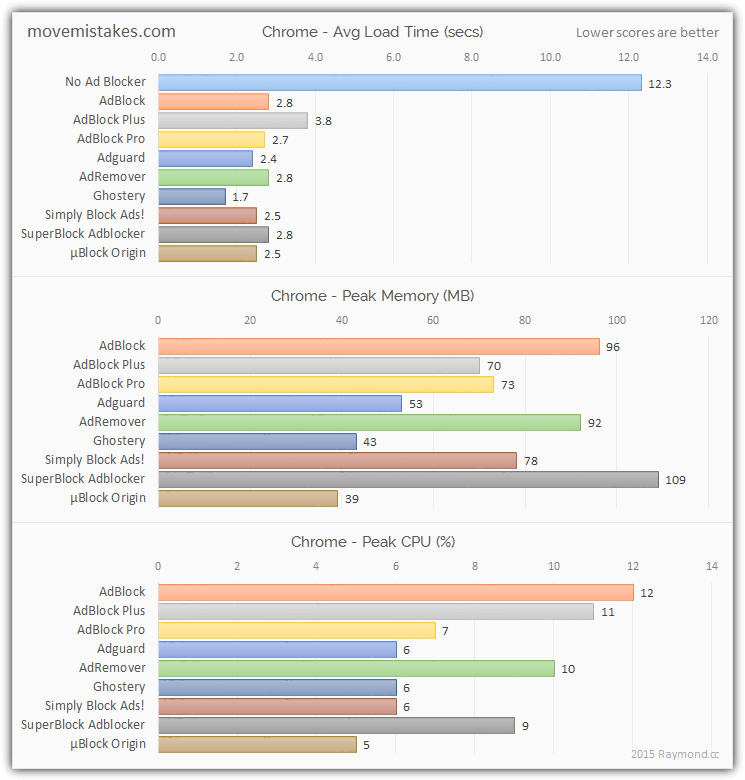
Almost all the Chrome ad blockers reduced load time by over 75%. Adblock Plus was the slowest by a second while none really suffered too much for memory memory and CPU cycles. Ghostery was incredibly efficient being the fastest and the second lightest on memory.

For Firefox the difference was similar with Ghostery being noticeably faster than the other blockers tested.
Sourceforge hosts a lot of open source software and hit the headlines a few years back by including adware in some of the software which caused developers like GIMP to leave in protest. While there are five ad banners on the main homepage, it does load consistently fast so you are not heavily penalized for allowing the ads.
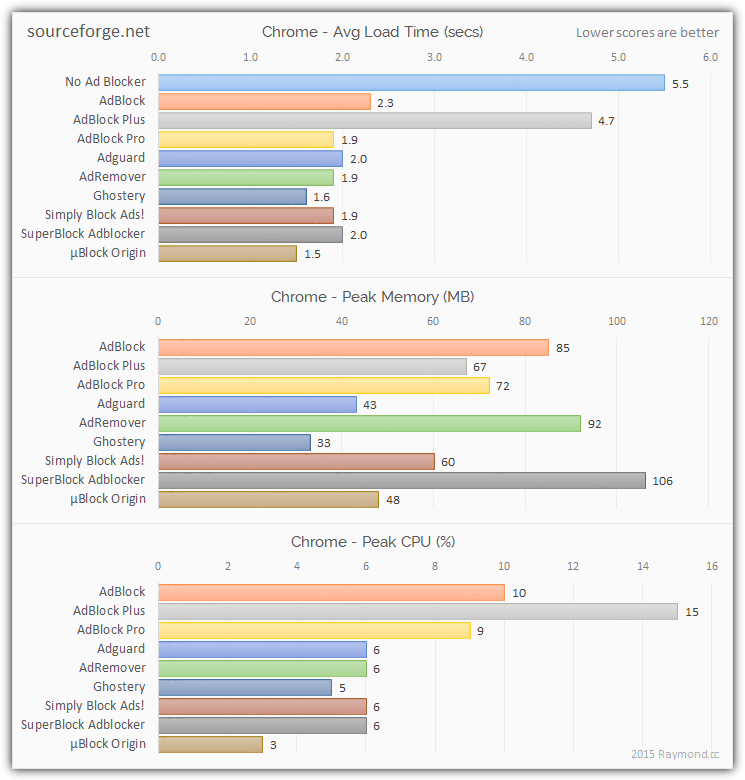
The best ad blockers in Chrome can reduce load time to a lightning fast 1.5 seconds. Most of the memory and CPU usage scores are quite low. One anomaly is Adblock Plus which uses more CPU and loads the page at almost the same speed as the page with ads.

The Adblock Plus result is similar in Firefox with a notably slower load speed, the rest are spread by only 0.3 seconds.
Tom’s Hardware is one of the biggest hardware and software news and review sites. The time to completely load the homepage was consistently over 20 seconds and it has 3 or 4 large ads near the top, and an ad from time to time that covers the entire window. The number of ad and tracking scripts is over 50 which affects the page load time.
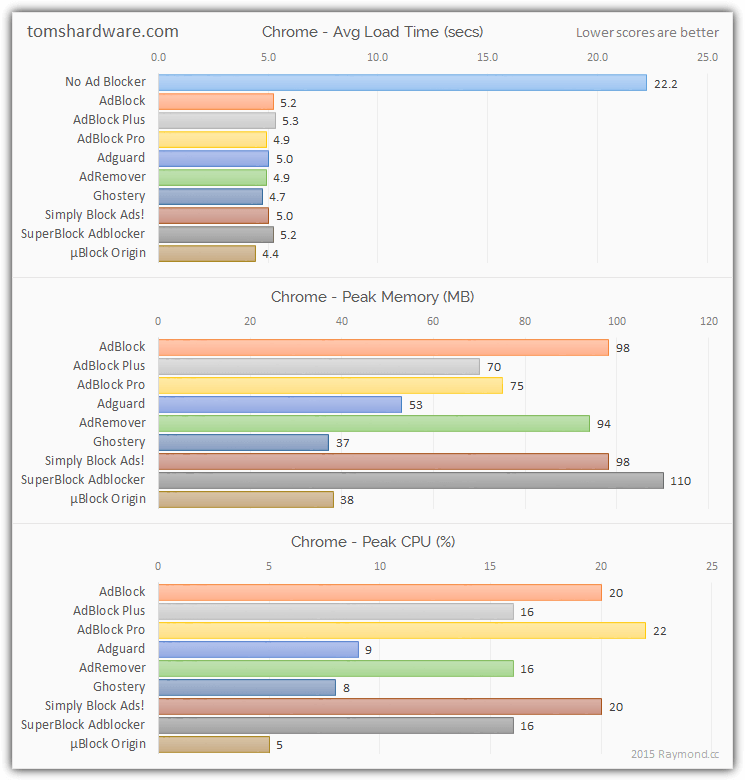
In Chrome all the scores were pretty even although µBlock Origin had an advantage in load time and CPU usage, Adguard and Ghostery again stayed consistent. Adblock and its forked versions were all higher for memory usage and CPU load was generally high with three blockers hitting 20%+.

For Firefox it was a similar story with the slowest (Ghostery) less than a second behind the fastest (µBlock Origin). It’s worth noting that Adblock Plus displayed an “acceptable ad” on this page.
Megagames has a bit of everything for gamers, including news, reviews, cheats, trainers and even game fixes (no-cd patches). This website doesn’t begin to load for 2-3 seconds, and a ton of ad, tracking and analytic scripts extend the overall load time by a sizable amount.
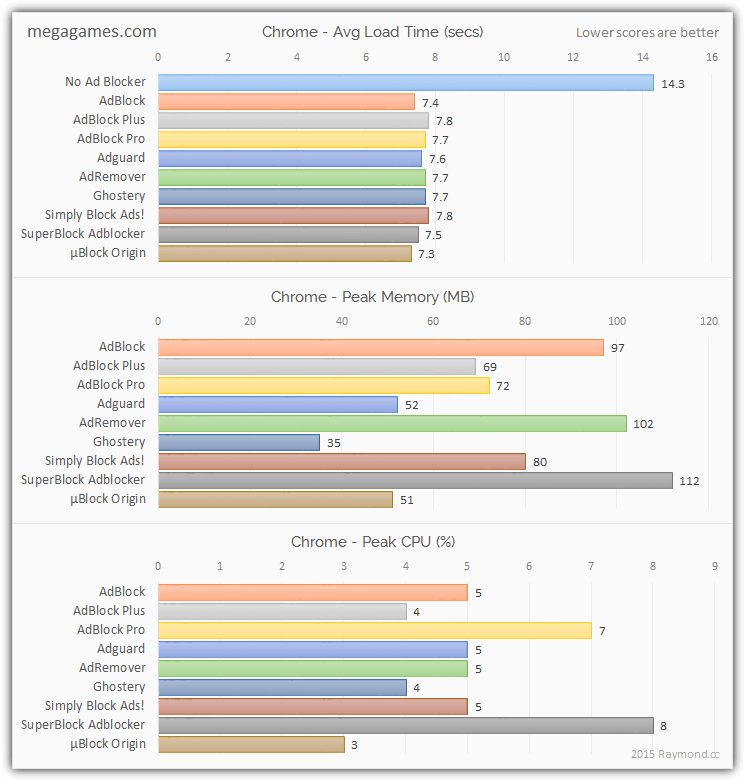
The best and worst times are only split by 0.5s and so close to be unnoticeable in real life. Ghostery, Adguard and µBlock Origin are again good on memory and processor usage while there were no terrible scores to write home about.

Times are also close in Firefox with Ghostery just slowest by a single tenth and AdBlock Plus fastest by a single tenth. The savings by using an ad blocker for Megagames are smaller compared to some other sites due to the overall slower page load time.
Raymond.cc
While we’re testing other sites, it’s only fair we should test our own, because like almost everyone else, Raymond.cc uses ads to help pay the bills. There’s a maximum of 3 ads on any page and none on the homepage or index pages. To test a page with ads, we have used one of our most popular articles as the test page.
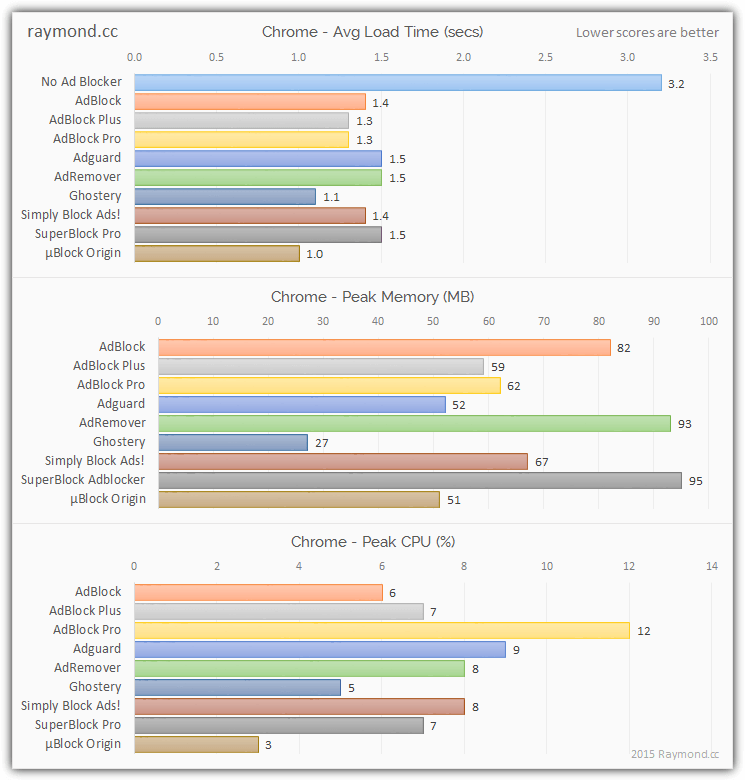
The normal page loading in Chrome was just over 3 seconds, an ad blocker cut this time in half and by two thirds for Ghostery and µBlock Origin. The memory usage was quite low across the board and only AdBlock Pro caused slightly higher than average CPU usage, at 12%.

Like Chrome, the Firefox times were tightly bunched and close enough to be unnoticeable in general use, µ Adblock was just fastest.
We’re quite pleased that during the tests our pages with ads displayed were comparable in load time to many sites where the ads are blocked, and the time difference between blocked and viewable ads is usually only around 2 seconds. This means you are not heavily penalized if you wish to continue to show the ads or enable the viewing of ads in your ad blocker.
We’ll now look at the combined scores and pick out the overall winners and losers.
Overall Results and Summary
It’s time to look at all the scores from the test websites as a combined total to see what the ad blockers have done overall.
Combined Chrome Results
Here are the combined average scores for all 10 websites in Chrome.
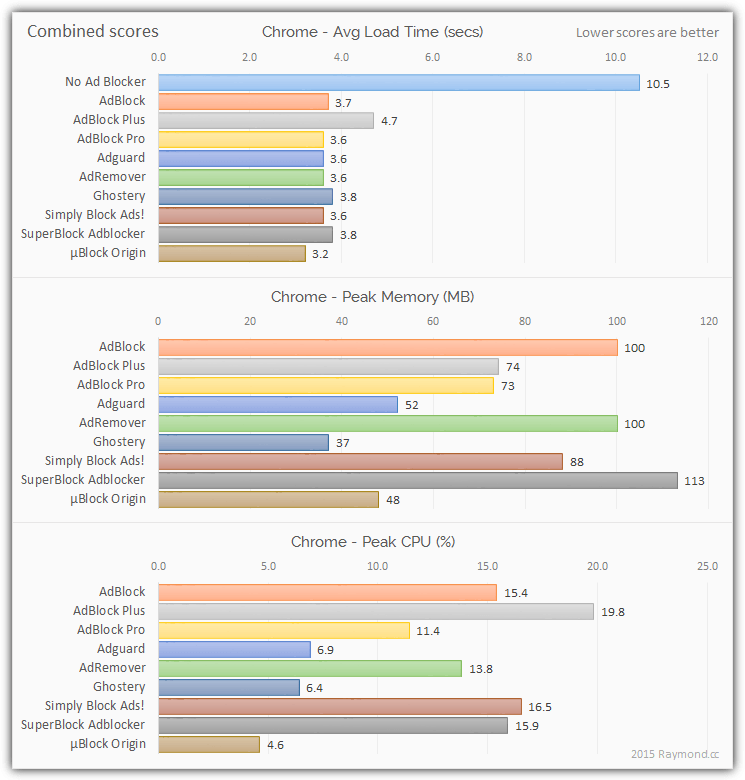
Page Load Time:
The results show that on average an ad blocker can reduce the time it takes to load a page with ads by around two thirds. Most averaged 3.6 – 3.8 seconds with a time to display the untouched page of 10.5 seconds. Two stand out, AdBlock Plus for being noticeably slower than the rest, and µBlock Origin for being a good 0.4 seconds faster than anything else. Ghostery would’ve been faster if it hadn’t tripped up at Airliners.net.
Average Peak Memory:
There’s certainly more of a difference in the average peak memory usage, Ghostery was incredibly efficient averaging a peak of 37MB across all 10 websites. Adguard was also very consistent and rarely strayed far from its 52MB average. The previous winner µBlock Origin is second but it’s memory usage did vary a bit site by site. SuperBlock Pro was the highest memory user, followed by AdBlock and AdRemover.
Average Peak CPU:
µBlock Origin won this time as well, being the least taxing on the CPU by an average of almost 2% over Ghostery, Adguard was a close third. AdBlock and the AdBlock based extensions all struggled to control their CPU usage on a number of sites. AdBlock Plus was the most CPU intensive, more on that below.
Combined Firefox Results
Here are the combined load times for all 9 websites in Firefox (tmz.com wasn’t tested).

Page Load Time:
Although not what we’re looking at, it’s interesting to see that Firefox was slower than Chrome to load our test pages in all but one test. All Firefox ad blockers were very close in the end, but like in Chrome, µBlock Origin managed to get a 0.4 second lead over everything else.
AdBlock Plus Anomalies
If you’re wondering why the popular AdBlock Plus got low scores in some Chrome tests, the answer is simple and it’s purely down to the acceptable ads check box. Disable “Allow some non-intrusive advertising” and AdBlock Plus will performance wise, sit in the middle of the pack.
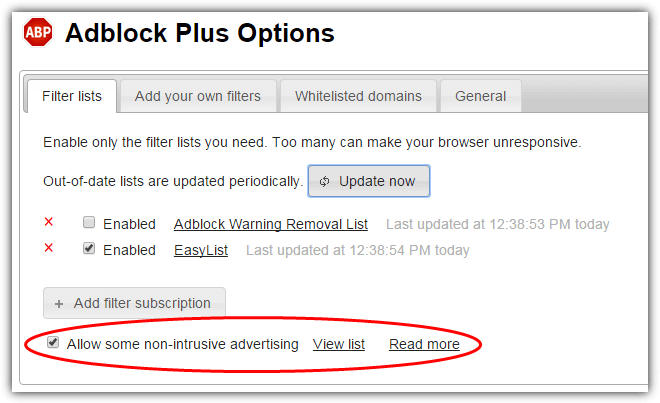
Whatever your opinion on acceptable ads, using the option in ABP is not recommended and if you wish to support showing specific ads while browsing, use something else. AdBlock, Adguard, AdRemover and SuperBlock all have an acceptable ads option of some sort, but none suffer a performance drop like ABP.
Multiple Tabs
What might surprise some is that with 10 tabs open and all test websites loading at once, an ad blocker’s memory usage doesn’t alter massively, the CPU usage can go up but it’s not a cumulative increase and having 10 tabs open won’t increase memory or CPU usage by 10 times. What does go up is the strain on the browser itself while loading multiple tabs, and it will use far more memory and processing power.
A more efficient ad blocker is preferable in this case so it and the browser are not fighting over resources. On the whole, an ad blocker’s memory usage is not a major concern with multiple tabs open, but its CPU usage can be, and the less CPU cycles taken from the browser itself, the better.
Overall Winners
The overall winner in Firefox is simply the quickest, and that was µBlock origin. µ AdBlock is a fair choice if you want an easy to use but fast blocker, the rest are almost identical so it’s down to personal preference and the options available as to which one you use.
The winner in Chrome is a closer call when you consider the results from all three tests. But as it got a couple of firsts and a second, we would say µBlock Origin is the definite winner, it truly is fast and efficient as the author claims. Both Ghostery and Adguard are still excellent choices and are viable alternatives to µBlock Origin providing good performance in all 3 categories.
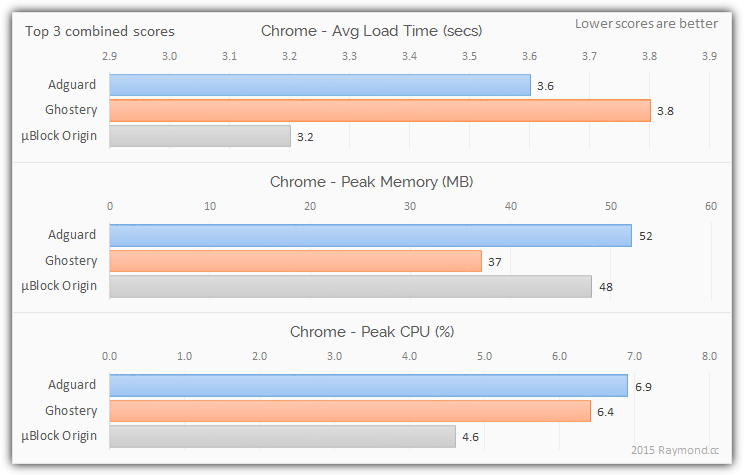
If you disable acceptable ads, Adblock Plus goes from being dead last to a blocker that performs similar to the rest. It’s worth pointing out AdBlock and it’s forked versions all suffer with higher CPU and memory usage, for that reason we would recommend something else if you have a low end system.
Of course, every web site, computer and internet connection is different and you would likely get slightly different scores on your system. But when the ad blockers are tested altogether in a controlled environment, the trends should be similar with what we have here. Also changing settings and adding/removing block lists will also likely have an effect on all 3 scores, which is why we left all ad blockers at their default settings.
Don’t forget, this test has been about the performance impact an ad blocker has on the loading of a page and the system’s resources consumed in doing so, it does not take into account other factors such as how many features are available and what can be blocked in additions to advertisements.
Final Note
Whether you think they are good or bad, ad blockers are here to stay for the foreseeable future and it’s up to each individual website to strike a balance between providing the well placed ads they require while not annoying people so much that they feel there is no choice but to use an ad blocker. If you keep your website loading fast and efficiently both with and without ads, it increases the likelihood people will not block the ads on your site or they will be more willing to whitelist your site in their ad blocker.
You can’t even view a modern page like C N N without ads resizing , re-scaling the page, you can’t even read the article without tools like this.
Super helpful this. Even as it was written 4 years ago, it’s exactly what I was looking for. Page load times etc may be a bit outdated, as mentioned in the comments below, but the overall performance comparison is still very relevant (to my needs).
Many thanks for taking the time to test and write this.
Why on earth would people complain (condescendingly, no less) about somebody ranking ad block extensions for performance? What are they doing here? Are their computers so fast that they have extra time to go to blogs on subjects they don’t care about just to post messages saying that they don’t care?
Anyhow…. thanks for the useful article! I hope it gets updated soon as the results are a few years out of date now.
Yes, sadly most of the ad blockers listed are no longer around, a lot of browsers have built in ad blockers as well so extensions are probably not so easy to make money from. We will update this at some point but, have no idea when.
It seems to be a culture we are living in these days where people like to complain about things that don’t affect them. If my PC was so fast that I don’t care about ad blocker CPU/memory performance, why would I read an article and then moan about it? ;)
Thanks for rating these extensions. I use AdGuard, as I got a lifetime 9-device license for it at a very reasonable price. I paid for it rather than rely on the free ones because the full version does some things at the OS level also, not just in the browser. I don’t know what all features are listed as part of the 2-pronged approach, but I am happy with its performance. I can disable it in the Firefox browser and the OS-level work it does prevents ads also, without the browser extension being needed on some sites. Together, they do a great job. And AdGuard is available for Android if you use one of two available Android browsers that can work with a browser extension (I chose the Samsung browser).
I don’t know why people would complain about your results, but there are always a few who will complain about anything. One complaint was a couple of years after the tests were done, and a lot can happen in that time. CPUs get faster (CPU speed does have some influence on page loads), basic-level plan internet speeds have increased among the major ISPs, and browsers have improved, all affecting page load times for the better. Of course, websites take back some of this improvement by using more data in their ads because the average person is updating their PCs every 2-3 years, but overall, things have improved, with or without ad blockers. I use an ad blocker because I start reading an article as soon as I land on the web page, and I don’t like the ads resizing, changing locations, moving the text I’m reading to make room for the ads, etc. Also, if I’m using my phone to view web pages, I can cut down on data use. One source I read estimated that 10-20 percent of the total data on most websites is for advertisements (I can’t easily verify that, but ads do use SOME data). About twice a year, I hit my 4 GB data cap during a month, and then fall back to 4G speeds (I only pay $15 per month for my Mint Mobile wireless plan, so I can live with 4 GB–adding more data for one month costs as much as my plan does).
Again, thanks for your hard work putting the article together, even though it’s not current. It does show the usefulness of using an ad blocker. Of course, if everyone used a blocker, the internet would work quite a bit differently. (I do unblock some websites on my laptop PC if they’re not getting in the way of my use of the site.) I’d love to see the article updated, and if you can get a trial version of the full AdGuard program, not just the browser extension, that would tell me even more about my ad blocker. Even if it gets beat out by another one, though, I’ll keep it. They update it often, and they have great customer support, so a second or two difference is OK by me in return for this.
Hello
Your blog is really great.
What i mean as saying blog is that big websites make alot of trash clickbaits but your website is great and is from your own test and exprience so i call it blog that is by far better.
Please update this posts:
In my opinion, todays great adblockers are
1. Ublock origin
2. Adguard
3. Brave browser native adblocking
4. Chromium’s own adblocking engine (currently blocks only those ads that google decided but you can see its true potential in bromite (a chromium open-source fork that is only available for android and is only available in its official website, not play store)
If may please comare these if you had time.
It will become a great article like what you always write :)
Thank you very much.
this seems weird, tbh. I know it has been posted 3 years ago but I doubt any of those pages need 8-15 seconds,without an Adblocker, to be downloaded.
Those times were accurate as reported by the browser. You have no idea but you “doubt” the scores anyway?
Most of those sites have since probably been updated and streamlined, but those scores were correct at the time of writing. Even the browsers themselves have helped improve page load speed in recent years. Also, take into account the hardware used was a run of the mill laptop on WiFi, not some powerhouse desktop PC.
about your last sentence: ……. some powerhouse desktop PC, sadly those creating the ads used those power house PCs. Those (close minded) individuals did not care nor give an thought to what they were creating which seriously taxed an computers resources. This caused so many to believe there was something amiss with their computers – invariably there was nothing wrong.
We have experienced responses such as: What changes have you made recently; what third party software have you installed; you may have an virus/malware, etc.
Many have – because of these resource intensive ads – went out and spent on new computers – BUT you can and will never keep up with the AD creators.
Ever notice how the heat builds when you go to an page or site with ADs?
An item causing computer difficulty is continuous scrolling – meaning as you scroll down additional data continues to load to your screen – there never seems to be an ‘bottom of the page’. It is akin to opening too many tabs. Our computers can not handle this.
What’s with the manic obsession with speed ! So it may load a second or 2 longer! Give me a break. With computing power and 32GB+ of memory available, is that what you should focus on? I be way concern of hundreds of beacons, trackers on each web site gathering data on you to sell to third party data brokers that will harm you in more ways than you even realize. Plus on those pop-up, malware injected ads, intrusive flash programs lighting up each page like it was the 4th of July, scams and spams, stop allowing marketers dictate the rules.
Quite ironic really, you ask what the obsession with speed is, then you mention it’s not necessary with computing power and 32GB of RAM. If speed is not necessary, why would you have an expensive powerhouse of a computer in the first place?
In case you don’t realise, most people have lower to mid end to computers where time to do something is going to be greater than a high end computer. Not difficult to understand really.
Dan has a point on this, 99% of laptop/desktops made in the last 4 years still has 4gb of Ram, the difference between the best and worst adblock still accounts for much less than 0.5% of Ram.
If that kind of difference is noticable, the owner should pay the $25 and buy an 8gb stick.
It’s a fun exercise to compare ram/cpu usage, but performance of an Adblock should be how it performs at blocking ads, ram/cpu usage is irrelevant.
I bet there are faster adblockers than these if you disable all filters.
He might have a point but is being condescending and using a ridiculous example. Everybody has differents opinions and people with a ‘my view is right, others are stupid’ attitude are unhelpful.
Paying more money for memory to accommodate inefficient software is not really the answer, getting your software running efficiently first is. And if choosing a more memory efficient ad blocker helps in a small way, then that’s good.
An ad blocking efficiency test isn’t going to be of much use because all blockers use essentially the same block lists to work. What would there be to write about when all the results would likely be identical?
Great answer.
Agree.
Plus there are people in countries with poor currency
Plus include mobile browser also.
It is really important.
This is exactly why many apple sheeps love their iphone.
In iphone because of strict review process of apple and its closed nature (that you can’t install apps normally without its official app store)
Apple sheeps always say “oh, my device is fast, great, haha”
That is because of optimizatons of OS itself + optimizations of its apps.
Then when they come to android install every trashy apps and don’t take their time to compare apps for performance and …. then they blame android for it.
This is really annoying.
That’s a “simple” user remark. More, it’s a reductionist opinion (“what fits me should fit all”). Imagine a browser with 20 tabs opened at once when restoring a saved browsing session. This should count plenty of seconds, right? Life is short and some people have to do a lot of things in the same bloody 24h day. And some of those some are quite fast thinker, they probably move faster than you, so they expect a slim and smooth browsing experience. Not to mention clean.
Next, think about the saved bandwidth and the benefit for the whole internet if you somehow manage to clean the trashiest of the trash lurking all over. It’s true though that some ads make sense and help others who help community for free, so that they can pay the hosting bill.
Next, consider the unnecessary IOPS you spare your SSD from and so it lives longer (I’m always using a RAM disk for browser cache, anyway).
Look….as long as we pay real money for the traffic we receive, I do not intent to allow others to force me into getting their bullshit in my browser. It bothers my aestetics, my eyes, it eats my precious time (and money), it’s meant to manipulate me into buying things that I most likely do not need and so on.
Long live ad blockers!
HAL9000 – I hope many understand your point.
Advertising has pitted us against each other.
Sadly – many have been manipulated/brainwashed to include advertisements to their internet content. – with getting paid for the clicks. When they detect you have an blocking device they get very aggressive – at times threatening.
Why would anyone want to cause Americans into losing their civility.
Realize – Freedom of speech goes both ways. I can say what I want, within reason, and also choose to ignore what I want.
Why am I being demanded to view – endure – advertising because you get paid for the ‘clicks’?
In all my years I have never purchased anything due to advertising. IT will not happen now.
By the way – the need for speed is for my own computer content – for smooth uninterrupted computer use when I enjoy the music. Do not like transients or buffering.
I’m more concerned about the text jumping up and down and all around as the ads are located on the page than I am with the time savings, except on a phone, where I have a data cap and those ads eat into my allowed data. And Adguard Pro (the paid version) comes with a module (Browsing Security) that works at the OS level, adding some protection against malware as part of the package. The Stealth Mode module adds to that and can strip URLs of tracking information. Other things it can do is hide your search queries, add DNS filtering, parental control, and more. This isn’t free, though you can find it discounted with a lifetime license for X number of devices for a reasonable price.
But few of these extensions ask for access which should be avoided right? It can access all the website and contents which is not good?
They need it because they should monitor all resources on all websites so they can block them but can’t deny that they also can use it for spying :)
Use a trustworthy one ;)
It tried AdGuard for Windows 10. Tell users not to bother with it. With AdGuard 10, the only chrome browser clone that would load any websites was Brave browser. Firefox would also not load any sites. Disable AdGuard 10 and all browsers load pages.
Beware! Google Chrome is going to block all adblockers from working. Shall we move back to Firefox, Edge and Opera? Of course we will.
Of course, Opera and the new Edge use Chromium as their base like Chrome. If Chrome doesn’t work, chances are they won’t either.
Well done. Though important things are missing:
You list ‘avg load time’ for ‘no ad blocker’
But why is report missing following?: ‘peak memory’ and ‘peak CPU’ for ‘no ad blocker’
That’s very unwise for comparison and we would like to know it.
The peak memory and peak CPU scores are for the extension itself, not the browser. Therefore, there isn’t a no ad blocker score.
This article is about testing the performance of the extensions themselves and not the overall browser+extension combination. If you read how we tested, you will understand.
Please compare the non Browser Extension Version of Adguard against all this. I think Adguard will Win this Game :P.
Actually, I use the desktop Adguard and think it’s great. However, this article is about browser extensions, therefore, the Adguard desktop app won’t be included.
Ever since this article was written (very useful by the way), Ghostery has become ENORMOUSLY BLOATED and uBlock Origin has stayed lean. Please do an updated performance comparison.
Good article. The problem with UBlock Origin in relation to Adblock Plus is that, if you have Ghostery and Privacy Badger installed also, Ghostery and Privacy Badger seem to “catch” more items coming through with UBlock Origin than it does with Adblock Plus, with EXACTLY the same filters applied.
Maybe it means that UBlock Origin is not set up properly, but with Adblock Plus, you subscribe to the filter list and go, rather than tinkering with the settings.
To avoid the so-called “white listed ads” in Adblock Plus, just untick the box to allow them in the “Filter Preferences” section, and they will be blocked.
Please do a refresh this summer (or sometime later) :)
The problem with Ublock origin is it cannot function with HTTPS everywhere, or it go sour in something once in a while. Well I probably find something.
Have used Ublock origin with HTTPS everywhere together without issue since their respective inceptions with NoScript as well and Ghostery as well in the past on FF. So I would say point your finger elsewhere, its more than likely something like flash you have installed.
Please add scores for FireFox Quantum.
BTW, Love your site. :)
What about uMatrix? You have to configure it for every site, but its bulletproof. You have full controll.
Damn good article, I’ve been looking for a solid comparison for years. lol So it looks like uBlock Origin and AdGuard are the top dogs, and all other forks and imitators are junk, cool. AdGuard is great if want to avoid the techiness of uBlock Origin. :)
Thank you, that’s an excellent review.
Would you, please, also do a review of the effectiveness of the same adblockers? This would be a great help to answer the effectiveness question from many users.
Great article. It helped me to make next decision: uBlock Origin – is my chose. Thanks.
Excellent article. I had uBlock Origin. It seemed like it BROKE half of my critical sites: banking, office VPN etc. AdGuard seems to be a decent compromise.
Thanks Raymond!
Do you plan to refresh the adblock test? It would be nice to see a comparison to the opera with built-in adblock and to Firefox Quantum with enabled tracking protector on always.
Thanks for the great adblock comparison
your banking and vpn sites have ads?, weird, anyhow you can just disable ublock on those sites permanently and then you get the best thing overall
Do you plan to refresh the adblock test? It would be nice to see a comparison to the opera with built-in adblock and to Firefox Quantum with enabled tracking protector on always.
Thanks for the great adblock comparison
Me: From my research: AdBlock™️ and its variations are the most well-know, but Ghostery is the fan favorite. But then µBlock is best from a technical memory & performance aspect. Being in IT I’m drawn to µBlock, so I ‘d also recommend it.
*Hits Blunt*
Friend: “yeah but which one is the best for browsing porn???”
Me: Bro i don’t know
——-
PLEASE RAYMOND HELP US
Appreciate the data. But you seem to have missed mention of a second important reason adblock is necessary. Content providers are subject to the hysterical religion that claims my desktop belong to someone else and they can put anything they like on it.
Not so. This is my computer. I don’t want to have to sweep my desktop clean every time I load a page or look around sticky banners and bars to see content. Adblock is not just about advertising. It is also about jerky code monkeys who have no respect.
Very well done test work. ypou have helpoed many people with this.
ublock origin is now practically unusable (unless you can tell me how to configure) for youtube.
That’s using both chromium (Iron) and Palemoon.
You’ll get a mass of videos that will not play, with the ridiculous error and link to ‘Watch on Youtube’.
Since you’re on youtube, when you click the link, it simply reloads the page to the exact same error.
For Palemoon, we use Adblock Latitude (available from their site) which works & allows viewing of video.
Haven’t figured out which to use for Chromium (Iron) but we are curious about ‘Fair AdBlocker App.
Lots of good reviews on it.
I’ve just tried ublock origin on 40 or 50 Youtube videos and it worked perfectly fine in Chrome. If you have customized any settings in ublock origin at all, maybe you should uninstall and reinstall the extension.
Palemoon user reporting in. Also have uBlock Origin installed. No youtube issues. The browser and this extension has been a godsend. It’s my go-to on any lower-end system, USB boot systems, systems running in RAM with about 1-2gbs. On my room-sized super-computer, I use Chrome or Firefox since so much of the code is unrelated to actually delivering pages…
Could you include the internal adblocker in the new Opera versions in you comparison? They claim to be 3x faster than external blockers.
Hi I use both adguard and u block origin. Is there any benefits of using both ad blockers at same time?
Not really, one or the other will be fine.
Wow, this was a quite elaborate test work. Thank you for your effort, I have been using ublock for long but wondered if anything else was better but nope, thanks to you :)
Noticeable difference with ublock, thanks for recommendation
You can install chrome extension “7 Times Faster”. It speed up your internet in 2 times by blocking ads and tracking. It’s fastest ad blocker
The uBlock Origin creator is Raymond Hill. Is this the same Raymond of this review?
No, Raymond Hill is not connected with Raymond.cc in any way. There’s more than one Raymond in the world you know! ;)
for any browser, and also palemoon, seamonkey, if there is no support from these apps, you could try winhelp2002.mvps.org/hosts.htm this is just a host file. that’s all you basically need. i will experiment with some of these apps just out of curiosity, but i think you will come to like the above suggestion. it’s so universal, you can use it on anything
Have you done a test for iOS content (ad) blockers?
No, we haven’t tested mobile blockers and it is unlikely we will do so.
Appreciated the professional approach and clarity of this report enough to disable my ad blocker on raymond.cc – which I’m very pleased to see did not adversely affect my appreciation of the site – and book mark the page. As a long time user of AdBlock Plus and Ghostery you’ve also given me a reason to look again at uBlock Origin.
As mentioned a couple of times in comments already, the broader field of privacy and user-side control would also be interesting if given the same editorial treatment. That’s a less focused subject but there’s probably an end-user sweet spot for ad control, privacy control and content control add-ons, trading off security, control and safety with complexity and resources. What is the optimum combination?
Great article, thanks! Any chance you could do a similar analysis of ad-blocking tools for iOS devices?
Highly unlikely, I don’t own and have no wish to own any Apple devices… ;)
I would like to thank you for this test, I almost bought AdGuard lifetime license.
although it works fine and 35 dollars for the lifetime license is still a good deal, your test shows that ublock origin is superior and free!
thanks again.
This test did not include Adguard, just the Adguard browser extention that is free.
Adguard software that you pay for is very different, it can block ads in software across your PC when available and is generally faster than every option here for browsing along with more features.
Why was Disconnect not included in these tests? I’ve noticed that it blocks a lot more trackers than Ghostery.
As we have said before, this is a test for extensions that have a dedicated ad blocking option. It’s not for all the general purpose privacy/script blocking extensions like NoScript, Disconnect or Privacy Badger, there are far too many of those to test.
I got here because I was looking for a review of Adguard AdBlocker (which promises an awful lot on their webpages). It did fairly well against the others but what I was mostly curious about was the actual effectiveness. This would be a much more difficult article to write. That is, how effective is a particular adBlocker against tracking, popups, video ads, anti-adblocker scripts, etc vs the others.
Currently I have a few extensions installed (Disconnect, Decentraleyes, the EFF stuff, etc.) and trying to find the right mix. Memory, cpu usage, etc… are great stats but if a well-behaved adblocker allows 5% more surveillance type attempts, that would be 5% too much. I’d be willing to take a hit on memory usage and some other related issues.
Another article could be how a combination of privacy/security extensions work together.
ublock for me. the best adblocker.
Is it “you-block” or “micro-block”?
These days it is uBlock (You block), I think the author changed it from μBlock (Micro Block) a while back to avoid confusion.
I use Adblock just because it is only ad blocker that can whitelist individual Youtube channels. It’s nice to support those you want and don’t support those you don’t want.
have u tried zenmate web firewall, its said to be based on µBlock Origin, i rarely looked at it since no setting available, its just works.
Nicely written (Y).
But there is another ad blocker which I am using these days and it is pretty cool – Bad Ad Johnny. I would like you to test it also because I couldn’t find any error in that BAJ.
Excellent and thorough testing! I have used AdBlock on Chrome and AdBlock Plus on Firefox for years. But I will be trying out uBlock Origin and possibly ghostery after seeing what a big performance difference there is.
Found you guys here a couple of days ago while searching for a clean Windows 7 ISO (which, by the way was obtained along with all of your excellent supporting data/info/suggestions). Thanks!
On my 64bit Windows 7 the main browser is the Chrome-flavored Slimjet, loaded with its’ native Ad Blocker, Ghostery, Dr.Web, HTTPS Everywhere, uBlock Origin and Adblock AdBlocker. Similar browser extensions in about the same amount are what I have in my OS X Mavericks Safari browser.
The main difference is in the time it takes for the same, identical websites I visit to load on these two different computers. The Macbook Pro takes literally a fraction of the time than the W7 does. It almost pains me to open Yahoo Mail while in Slimjet. Go figure, right?
In another forum where I’d begun a thread to find whether there was an app or program designed to alert a user *which* adblocker was causing issues on a site that wouldn’t function unless it (the adblocker) was disabled, an irate user there insisted that the cause for the delay in W7 pages loading was directly attributable to the number of adblockers installed.
What say the jury here? Anyone else had pages take too long to come to life because of adblocker usage?
I’m not sure why the other person got mad, but in reality, he does have a point. It’s useless having more than one ad blocker because they are all trying to do the exact same thing, so there’s always a risk they will get tripped up by each other occasionally. And you have 4 ad blockers which compounds the problem.
It’s a similar story with antivirus, people who think the more the better are sadly misguided.
Try RedMorph! No while list, total user control, fastest and most complete tracker blocker on the market
Why did you take the overall memory information in Windows and not the RSS size, for example? I do not think your memory measurement adequately represents the efficacy of each tool to handle their activities using the lowest amount of memory. Also, what was the update interval for both memory and cpu values regarding average calculation and displaying?
As far as I’m aware, RSS is the same as Working Set in Windows, and that includes shared memory, so the used memory values will be higher than those listed. Private Working Set is better because it shows the memory used only by the process itself. Both Windows Task Manager and Chrome Task Manager use that value as standard.
The update interval for memory and CPU values were real time.
Thank you for clarifying this. My bad then, I stand corrected.
Amazing test! Very scientific.
The results you showed were technically based, but what about the functionality of the different software? Did one block more ads and keep the user safer than another one? I’m willing to wait a bit longer if I don’t see porn ads or expose my browser to mallware.
Almost all ad blockers rely on the same block lists so they block the same amount of ads. So in terms of safety from bad ads, they are virtually all the same.
Excellent! Thanks a lot!
Extensive testing, good visualization, great article! Thanks!
Great read! I had been looking for this very article…One more adblocker that i would have liked to see on the list is Bluhell FIrewall, which i use on my Android with Firefox (I believe its only for Firefox) Its not as good as Ublock, but is VERY easy on CPU…It blocks enough ads to make the internet easy to navigate still…Only time i may get an ad with BLuhell is going on sites most ppl dont go to anyways…No options or filtering, at all…Just an on/off button in the toolbar, which is welcomed by A LOT of ppl who want “simple”
Hi, Did you cleared caches and cookies everytime while testing each of the extensions?
Browser caching was disabled for all testing.
“As said above, we’ve no interest in testing exclusively on sites people possibly shouldn’t be going to anyway”
Not a comment I expected to see. Everyone at some point either visits such a site intentionally or unintentionally. I am not sure just what your comment is intended to cover anyway. Any site where WOT suggest a poor rating?
Sorry, that sentence referred to a now removed thread where someone asked if we could rerun the tests and use illegal video streaming/downloading sites as the test sites.
.
WOT Web Of Trust has been pulled as of 2016-12, reportedly because they were selling user browsing info.
.
Excellent job on stated objective (me being impressed and very appreciative). This is one of the very few objective trials in an important area. I think any PC oriented magazine would welcome it.
Please consider including a few more products (me being curious and self-interested as I use Blur and Disconnect). As you note for PrivacyBadger, these 3 are more privacy oriented but do overlap functionally to block some ads and (I think) improve responsiveness.
Please note whether you encountered obvious/gross site problems (me being critical). Perhaps strictly outside of scope, but trivially difficult if limited to cursory observations and still interesting.
Please consider expanding the scope to include effectiveness, including privacy measures (me being curious, encouraging, and very greedy). AKA, the limitations and further research paragraph.
As for the remainder of your copious free time … (me be humorously(?) appreciative of your contribution).
Thanks for your input. We encountered no major page problems during testing, if we had, they would have been mentioned.
We had to draw the line somewhere for what to include in the test. There are several dozen extensions that can block scripts, which just happen to block ads. To include them all or to decide what to keep and what not just isn’t feasible.
Effectiveness in terms of ad blocking is almost identical for all extensions because virtually all are based on Easylist, so they block or miss the same things. Testing privacy is beyond the scope of this article and an entire subject in itself.
Excellent article. You did not mention whether blocking caused problems, nor evaluate web page appearance.
Ad blocking is also about privacy. You did not mention how many 3rd party cookies were blocked, etc.
I hope you will consider examining Privacy Badger, Disconnect, Blur by Abine, and HTTP Switchboard soon.
Again, thanks for the great info here and over the years.
Also thanks to Tom Trottier for his nice list. Unfortunately, combining some of these can effectively disable some.
If sites stuck to simple ads (especially no flash or moving ads, popups, text rollovers, skyscraper ads on the side that prevent/delay scrolling), loaded content before ads, respected Do Not Track (which does _not_ just mean do not customize!), and did not try to disguise/confuse ads with content, none of these would be necessary.
As we made clear in the article, this not about how effective these extensions are concerning privacy and cookie or script blocking. It’s purely about efficiency and the performance effect they have on your CPU and memory while blocking ads.
Something like Privacy Badger was not included because it is not designed to be an ad blocker but a script blocker and privacy tool. Blocking ads is a by product of script blocking and Privacy Badger themselves make this clear in their FAQ.
info for those like me feeling left out… heh
Adblock Latitude is a direct fork of Adblock Plus made specifically for the Pale Moon browser.
addons.palemoon.org/extensions/privacy-and-security/adblock-latitude/
Ads are only the surface of malware & bandwidth. Other extensions offer finer grain control of what gets loaded:
µMatrix offer fine grained control of cookies, css, images, scripts, plugins, XHR, and frames
BetterPrivacy controls flash cookies
Calomel SSL validation shows how secure the webpage is
Certificate Patrol shows who has OKd new certificates
CleanLinks deobfuscates hidden links
CookieWhitelist controls cookies
Masking Agent stops “fingerprinting” as a substitute for cookies.
Noscript controls scripts & XSS
Priv3 stops social site tracking of you on other sites
Privacy Badger conlrols most 3rd party cookies
Redirect Bypasser gives you direct links to other sites
Redirect Remover cleans links on loading pages
Request Policy controls what other sites are loaded.
SmartReferer sets the “referer page” for external links
UA Control controls what websites know of your OS & Browser
UnshortenIt shows safety ratings of indirect links.
——–
The downside of using all these is that you often have to explictly open multiple doors for sites to work as you want, but usually, only once per site. The upside is — no malware delivered by scripts.
The sad thing is I would have once thought this unreasonable. Now I’m considering using most of the things you have listed here.
Finally, some objective numbers…there is a new adblocker I use in the past 2 weeks adblock ultimate. can’t wait to see how it performs in your tests
Though to be fair there are some adblockers which support more filter list formats. For example uBlock Origin supports hosts files like hpHosts. Others don’t support this format so they won’t be able to block sites with that list. Also many adblockers can’t block sites from loading completely or block redirections but uBO can.
Several ad blockers support custom lists and so you can easily block using the hpHosts lists or anything else and the results will be the same. The point with uBLock Origin is it’s classed as part firewall by its developer and so isn’t merely an ad blocker. If this was a test of malware protection or firewall abilities from your ad blocker uBO would probably win, but that’s a whole other subject entirely.
Wonderful post! Been using uBlock Origin for months now. Glad this article just reaffirmed my decision.
Thanks for the article. I’ve used most of these and have settled on uBlock Origin alone for Chrome and Firefox on Mac.
Very good post, now I would like you to test desktop adblockers like admuncher, adguard premium trial or Adfender. GTsoft etc.
I dont know about you guys; ublock origin DO ITS JOB REALLY WELL! I tried all does other stuff but ublock is much more efficient for me! THUMBS UP!
Great testing guys. However, I’ve tried several adblockers over the last few months and all have had one major problem – over time, as I have had to adjust my filters to allow ads on some sites that simply do not load buttons and forms when enabled, all of the adblockers I’ve used have at some point slowed firefox and my laptop in general, to the point where it is simply unuseable. Originally, I used adblock+, then went to the edge version when this slowed everything down, then adblock edge stopped working at all, so I tried uBlock Origin and lastly, AdGuard. They have all sowed everything down after about a month or so of use. I have used various tools to clean everything up (cache cleaning, junk file removal, reg. cleaning, defrag, etc), but they have little effect once an adblocker has been installed for a while and the only cure has been to uninstall the adblocker. Anybody else had this problem and any chance of longer-term testing of these add-ons?
Robert, I know my response comes a while after yours, but I see you were looking for feedback. I have been using adblockers for many years and all the reputable ones noticeably speed up page load times and browsing in general. The fact that you mention that they slow down your laptop in general is an indication that you have another issue that is causing this problem. The most logical would be that you have a low spec system and that the extra RAM and CPU usage of the adblockers is maxing it out. It is also possible you may have been infected by some form of malware that is attempting to counteract the effect of the adblocker. Have you tried running Resource Monitor or a similar utility to identify the real cause of the problem?
Wayne, some sites do need to be allowed to show ads to load.
Never it was a cpu or ram issue.
Sometimes they do tricky things. Sometimes a refresh can bypass it, but I think it depends on the way they set up the page load. If it’s waiting for an ad to say “Hi!” it will not load the rest and you get a half assed page loaded.
This is a great post, so much well researched and well presented detail. Thank you!
I agree with in every single bit. Thank you for the kiss.
I use FireFox 41.0.2 with AdBlock Plus and I un selected to ” allow non intrusive ads ” but on sites that do limit the amount of ads and that i use and like i white list them ! I have a decent older quad core and a few ads do not slow it down but some news site and c/net and use so many ads and trackers and auto play videos that i depend on AdBlock Plus !
This site is white listed as you guys do limit the ads and i can see your need for revenue !
Thanks HAL9000 and Raymond and keep up the good work !
Great info.
Just wanted to say thanks for such a thoroughly researched and extensive article. I’ve been doing a lot of Googling for Ad Blocker research, and there is limited data, and much of it is outdated. This was refreshing, keep up the great work! I’d love to see a similar article about effectiveness, because picking an adblocker (or more than one) is really the sum of performance + effectiveness.
I’m glad you found the article useful :)
Testing effectiveness is far too difficult to measure which is why we haven’t and won’t be testing for that. Testing performance is easier because we’re talking about hard numbers, effectiveness is hard to pin down and isn’t a defined score or measurement.
To everyone asking about it: Rating efficiency is very hard especially since a blocker that blocks more might also break more sites.
Would be nice if you could include Karma Blocker if you ever run the test again. It’s not like Privacy Badger which has to learn but instead uses a scoring system like SpamAssassin.
Thanks for the thorough testing!
What I’d love to see is a test of adblocking in the router, with the PC running only cosmetic filters/element hiding rules. How much faster would that be, would it save any amount of CPU/RAM?
Because setting up ad blocking in your router is more of a hassle than installing a browser extension, insights from such a test would be really useful.
On the +4GB RAM PC front, the battle is moot. But for old PCs, netbooks and smartphones it is crucial.
Blocking from a router would be very much hit and miss because there are so many different routers out there and it would be difficult to get get accurate results. Some routers wouldn’t do that anyway and for those that did it would be a lot of manual work.
On the memory front, there are a lot of smaller form factor devices around these days that run Windows and most of them are coming installed with 2GB of RAM. Even in 2015, memory usage is still critical on a lot of newer devices.
I’d also love to see is a test of adblocking in the router as this blocks abs on the iPad & other devices also we can block websites that are not suitable for kids.
That is just far too much effort as in my own router it would require putting in thousands of blocked addresses or keywords one at a time. Most people aren’t interested in doing that when an ad blocker (or parental control software) can be setup and use with a few clicks in a couple of minutes.
FYI you wouldn’t need to type them in manually. You can use this: pgl.yoyo.org/adservers/
It allows you to set up options for list output to suit whatever application you want to throw the list into. I use the dnsmasq preset so I can block ads on my entire home network at the router level.
Unfortunately that is exactly my point, my own router doesn’t allow me to add any type of list and I would have to add each IP to block manually, one at a time. Many other routers probably don’t allow adding of lists. As my router is supplied by and locked to my ISP, I am unable to use a different router.
I change AdBlock pro -> µBlock Origin, and i’m very happy now. µBlock Origin is much lighter & faster. I will never use AdBlock Pro anymore.
> does uBlock have any similar CSS at all
Yes, CSS rules are supported. ABP calls these “element hiding filters”, while I prefer to call them “cosmetic filters”. It is possible to create a backup of your ABP settings and import the resulting text file directly from the “My filters” pane: uBlock Origin will extract and import your custom filters from the file.
Sorry, this was meant as an answer to Marah Marie at the bottom of the comment section, not sure why this ended at the top.
One worthwhile test would be, does the script have a way to deal with sites that refuse to work if they sense an AdBlocker? Hulu wants you to see their ads and won’t load video without your adblocker turned off. Some adblockers have ways to get around this. I’d like to know which ones do without installing each one.
That is obviously something completely unrelated to what we are testing, we’re testing their performance, not their effectiveness.
This article was great! Do you have another article that tests effectiveness, or plans to do so?
@HAL9000
Was just suggesting to state that “coding efficiency isn’t the purpose of this test” in the article.
And Firefox 41 performane improvememts are specifically for ABP.
The ABP improvements for Firefox 41 are memory related so it has no bearing on our results as we didn’t test Firefox memory usage (and we’ve explained why).
@Raymond
> comparing the coding efficiency
> isn’t the purpose of this test
That should be made clear in the article because it may be taked that it is.
It’s made clear the blockers on test were ALL left at default settings. If ABP runs badly compared to the others on default settings, that is the fault of ABP. To change just ABP settings is cheating to give it better scores, to change and test all settings in each blocker would take dozens of man hours to test and is simply not possible.
On your other point, we will not be retesting for Firefox 41 as it would then be unfair to not retest for Chrome 45 because it also has some improvements. If we did that there would be multiple retests every few weeks for each new browser release, and that is something we are unable to do.
About the comment that mentioned Firefox 41 improving Adblock Plus memory usage :
It is actually an overall performance improvement including page load time and not only memory usage so it is worth a follow-up.
Also using the defaults is unfair to ABP because tweaking it and adding more filter lists (at least the same as others) makes it block more and perform much better.
If every adblock is tweaked with the same settings and configured to use the same filters, then we’re comparing the coding efficiency which isn’t the purpose of this test. We’re more focused on testing the out of the box settings which is mostly used by normal users. It is the author’s job to ensure that their extension have the right balance in efficiency in blocking ads while not slowing down the browser to a crawl.
Furthermore, there are adblockers that does not have any configuration at all. It doesn’t make sense to attempt hacking the extension and then benchmark with the rest. That would be even more unfair…
Ghostery is not an adblocker strictly speaking though it does kill a lot of ads its purpose is to stop tracking scripts.
I understand that uBlockO uses less resources if ‘parse and enforce cosmetic filters’ is unchecked. This deals with the hiding elements of the adblock filters. Some people need this but I could care less. I’m curious though whether you had that option checked or not.
Great work btw.
You are right, Ghostery is not a traditional ad blocker and more of an all round privacy blocker. We chose to include it because it can be used as a standalone ad blocker and you can choose only to block ads going through the wizard on setup. That is why Ghostery is in and other privacy and script blockers are out.
As it says in the article, all ad blockers were left at their defaults. If we change a setting for one addon, we have to start changing settings for all of them, and that is definitely a road we were not prepared to go down.
.
Perhaps inspecting and reporting on each ad-block program’s options would suffice, but maybe that’s a separate “Tweaking Ad-Blockers” article, not an update to this.
I suppose the challenge is to inform the user about the effect of choices:
— one software may offer more blocking capability = longer load time
BUT that may be preferable to some folks versus
— another software loading quicker = less blocking capability
I often use AdBlock Plus [ Block Element ] highlighter to remove dancing baloney and filagree that the web page designers implemented regardless of script calls for external advertisements.
Yes, I know that is not the intended use of ad-block software.
But, just as opening a can of paint with a screw driver is not in the owner’s operation manual for a screw driver, yet we all do it … the ability to manually add [ Block Element ] to any web site’s pages is a godsend for me to compensate for bad web page designers who have not read Steve Krug’s excellent book on web design “Don’t Make Me Think”.
I’d like to replace all web page’s crappy CSS with my own easy-to-read neat, simple, academic-reference-book-style web page design if I could ( see csszengarden.com for possibilities ).
I’m exploring browser extensions to tweak font size relationships, and to shrink page % without shrinking readability, and an ad-blocker’s ability to also eliminate non-content “noise” is just one piece of my ultimate goal — CONSISTENT READABLE WEB PRESENTATIONS EVERYWHERE.
I digress, but just because what I want isn’t a straightforward product at the moment doesn’t mean I’m not onto something.
.
Hi. Thanks for all the work & testing. Very helpful. Any thoughts / experience with any of these ad blocking extensions on OSX , esp. Yosemite & El Capitan? Have you tried Raymond Hill’s other extension, uMatrix? It provides an array of additional criteria — block or whitelist cookies, css, images, plugins, scripts, XHRs, iframes, etc. Although the user interface is more time consuming, I suspect the greater selectivity enables a further reduction on browser resources.
No, I haven’t tried or had any experience with these addons in OS X.
I have tried uMatrix personally but not for these tests. It is for advanced users only and the author calls it more of a firewall than a simple ad blocker, and you need to know how to use it properly to unblock elements that are causing pages not to load correctly, which there is a fair chance of.
Glad to see you guys doing another article! Was about to remove it from my hotbar for the RSS feed.
I use Cyberfox (64-bit), Waterfox (64-bit), Firefox and Chrome for my daily web browsers (each has their specific purpose).
With all of them I use Adblock Plus, with some minor tweaking to the subscription and disabling “acceptable” ads.
I retested these sites as I went through the article to see if page loading and website cpu process were similar.
One thing I think is a major difference is the speed of your connection. All but TMZ, I was significantly faster than the readings you had. TMZ actually was spot on with yours lol. However, I was also using a VPN connecting to the Netherlands at that time (which made little to no difference upon disabling it).
I am, however, going to switch a few browsers around to use microBlock and Ghostery to see if they are any better for what I use the internet for. main reason I haven’t switched to them is that they were said to “break” webpages. This was coming from a few review sites. However, I do trust you Hal9000 and Raymond a bit more than some of them, so I’ll give it a shot and see how it stacks up to what I am used to.
I see this article serving 2 purposes: primarily testing out the performance of each of the major ad blocker out there in a head-to-head controlled environment. The secondary is giving people a look at other options to see if there is any improvement that can be made to their setup. While the secondary ties with the primary, the point was that some of these ad blockers I hadn’t heard of. Specifically one that ranked in the top 3: Adguard
You guys always do great work, and while I wish you could more, I know it’s hard to find new and interesting topics to do while also finding the time to do them all.
I do thank you for all the hard work you done and I’ll be leaving you on my hotbar to see when the next article will be :)
Thank you for the nice words, it’s nice when somebody “gets” the goal of the article and not just coming up with a “you missed xxx” comment…;)
My connection is around 10mbps so it’s not terribly slow, but it’s not terribly fast either, we also had to be quite careful at what times to run the tests. Some sites show a sizeable difference between where you are and whether you are running the test in peak or off peak hours.
Don’t delete us from your RSS just yet, we’re trying to get more new articles out in the not too distant future…:)
Very interesting article and test …!
I first used AdBlock, then later AdBlock+, then AdBlock Edge + Ghostery, and now for a few months uBlock Origin, and now pages load at least twice faster than with AdBlock Edge + Ghostery …!
I just can’t count all the friends and family members I “converted” to these blockers, and that can now surf much faster and “peacefully” …
Thank you, You have to be careful when running more than one extension that does the same thing because it can actually slow the whole blocking process down. If Adblock Edge + Ghostery was setup to block the same scripts, that could have been part of your problem.
There’s not doubt though, on it’s own µBlock Origin is the fastest single ad blocker we tried in the test.
FYI, Firefox 41 (currently in beta) includes fixes that dramatically improve memory usage with Adblock Plus enabled. Might be worth a follow-up!
mozilla.org/en-US/firefox/41.0beta/releasenotes/
Interesting information but until Firefox offers a more accurate way to find out how much memory an extension actually uses, there will be nothing to follow up…
What about measuring site memory usage via about:memory? Also, nightly builds have an experimental about:performance page that offers more fine-grained information such as CPU usage. I believe it’s enabled for DevEdition builds as well.
About:memory doesn’t show the true amount of memory used by the extension. For example some extensions will show in there as using only a few KB while the Firefox process itself goes up by maybe 20-70MB as soon as you enable it. The About:addons-memory extension which pulls its data from there gives a brief explanation.
The About:performance in Firefox nightly is still experimental, isn’t totally reliable and doesn’t update the CPU usage numbers in real-time, the window is currently a big resource hog in itself. If when it’s released to the stable channel, it works well, then the performance window may be something we could read CPU usage from…
using CyberFox 41 beta with Adblock Plus, great improvement.
Nice test. My choice is Adblock Plus because of the Element Hiding Helper nevertheless it is a resource hog sometimes. Too bad that Adfender wasn’t included in the test.
On pure performance, ABP is not the best, even with acceptable ads turned off it’s about average.
Adfender wasn’t included simply because it’s not a browser extension.
I didn’t say that ADB is the best but the Element Hiding Helper is really a nice addition which I can’t afford to lose. Hmm…it seems that Adguard and uBlock both have this feature as well and I may give them a try.
I wasn’t implying you did say ABP was the best, but I was referring to how it performed in the article, which is after all what the comments should be about…;)
Very nice article, Thanks for posting.
Please send a link to this page with an appropriate introduction to all the sites you have tested so that they realize how atrocious their sites are and can look at improving things for themselves and their visitors. This applies to your site as well, even though it’s just 3 seconds without an ad blocker. :) If every site would load in 1 second or so (plus the latency impact), we would all be so much more happier with the web.
To be perfectly honest, i don’t think a lot of those big sites really care that their pages have huge discrepancies between running with and without ads, most of them are owned by larger parent companies that aren’t really bothered as long as the site pays for itself with a bit of profit spare. TMZ is owned by Time Warner, CNET by CBS Interactive, PC Advisor by IDG etc.
There is always going to be overheads when displaying ads because files are downloaded from a third party. Our site shows about 2 seconds or so is probably close to the smallest difference you can have between showing and not showing ads.
If every site loaded in 1 second many would have no images and all would have no ads, but because of that, there would be far fewer sites around, including the good ones…
Just want to say what a GREAT article and useful test data you’ve provided! Haven’t seen this kind of comparison anywhere before! I use Disconnect now and feel it does a very good job with page loading times and the non-tracking/privacy features.
Thanks for the comparison! If you run another comparison in the future, it would be very helpful to see memory and CPU with no ad blocker. As a control. Inmany cases, these extensions prevent browsers from needing to parse and execute some JavaScript and decode some images. This effect will be bigger on ad-heavy sites. Including the control would reveal the net result of each extension’s performance on each tested site vs an un-blocked experience.
As discussed previously, getting a control sample of memory and CPU with no ad blocker is difficult because it’s in not in the ad blocker’s process but spread across other processes such as the tab process, Flash process and possibly even the GPU process. All those processes jump around in usage by huge amounts so an accurate reading’s not easy.
Another factor worth testing is the number of sites broken by the adblock. I tried Ghostery for a while and eventually removed it when I realize it was braking so many sites.
That is a totally different subject altogether….
On a side note I’ve used Ghostery over extended periods on several different computers and don’t recall it breaking much, if anything.
Ghostery breaks a ton, and i have to shut it off a lot to get a website to let me chat in it, or to let me use a form that i need to do some bills etc..
That’s because you’re probably using it with the all on blocking on approach, like many privacy or script blockers they turn off all scripts to start with and you have to let the ones you need through….
It’s not “breaking stuff”, it’s blocking what you’re telling it to.
It does. Thirded. And same deal…I also need to disable it to make many websites usable (with it hiding comments being the worst problem by far…not sure why it thinks Facebook comments and Disqus should be blocked altogether…not sure how third-party comment sections wind up counting as “ads”…).
I think you need to understand how addons like Ghostery work, they block what you tell them to (you turned on widgets during the wizard setup), if you don’t want comments blocked, turn the widgets option off or disable per site…
Thank you for the breakdown, I really appreciate it. After having installed ABP on a host of family computers we saw consistently faster load times for nearly every site.
One thing you dropped the ball on was collecting metrics on the total bytes per page with/without the ads blocked. My Dad lives with a 768kbps DSL line and adding ABP caused many pages to load 10 times faster just from the reduction in bytes. When I did some before/after metrics it was typical to reduce the total byte count by a factor of 6-10 times! Especially on sites that have animated GIFs or audio/video ads that load, even if they don’t automatically play the audio. Ad blocking is a lifesaver in low bandwidth places!
Perhaps you misunderstand the test slightly, it’s not really about testing with an ad blocker and without and then finding the differences, it’s about each different ad blocker and what they do to page load time and how much resources they use in relation to each other.
The problems you are talking about will be cured by just about any ad blocker, with ads blocked they all reduce the page load time by roughly the same amount, give or take a few KB.
Nice to see you back!
SilentBlock addons.mozilla.org/en-US/firefox/addon/silentblock/ is one you have not tested. In my experience it is one of the best (the best?) in speed and memory footprint.
However, you should be able to edit the config file if you want to modify its default blocklist. These are regex (Regular Expression) patterns and may frighten off those who are unfamiliar (with regex). High ease of use for those who know how, and close to zero for those who don’t.
SilentBlock actually blocks nothing out of the box and you have to learn regex or manually download and install pattern lists just to get it to do anything. If we left it at default settings like with all the others, it wouldn’t block a thing and would therefore be pointless to test with…
This extension is not exactly a blocker, but a deep cleaner tweaker extension, just take a quick looksee….. hotcleaner.com/clickclean_chrome.html
I am disappointed the Disconnect plugin did not make into the cut. I recommend Disconnect, over Ghostery & uBlock Origin, because it works out of the box. Ghostery does not block anything by default, and uBlock Origin is also a little fiddly if you also want to block third party tracking. You need to enable more lists. Not very user friendly.
Disconnect is another one of those addons that can block ads because it’s a general privacy/script blocking tool. We are not going down the road of including every script/privacy blocker just because it happens to block ads, there would be dozens of them. These extensions are all ad block first, the rest is an option.
Also, Disconnect cannot just block ads alone without configuring every site manually, and that breaks our rule of not changing any configuration options. The only exception was Ghostery which forces you to go through the wizard on first run, then we could choose just ad blocking. If it didn’t do that, Ghostery would not be here either.
60 Río de Piedras, S. O.
thank you Ray, It’s good o have you back!
Thank you for a true run down. I have one question.
In using Chrome or Firefox…. should I be running uBlock Origin and Ghostery? or is uBlock Origin on it’s own OK? I can’t figure out if there’s an overlap.
Personally I use both simply because Ghostery is good at blocking social buttons and widgets but allowing you to enable them temporarily with a click. I only have the social option turned on in Ghostery though.
You should probably try one or the other first though to see if it suits your needs, they both block a lot.
Thanks for your response and everyone else! Good Man!
The best and the fast that I have here is K9 with ABP. K9 is a parent control but you can also check that it will block ads. And then in ABP I checked everything out because if you have the standard filters on, you notice a big difference in speed and that you not have with K9 but I have my own filters and the first is to filter the screen of the dog of K9 out when it filters ads so you do not see anything on the page what you do not want to see. Just add ‘127.0.0.1:2372/blockpage?id’ in a new filter and you are good to go.
Hell yea Raymond.cc posts are back!
Thanks for the read it was quite interesting, uBlock origin with some extra subscriptions is enough alone to combat ads, malicious websites and trackers usually, in my opinion.
@author you forgot “PRIVACY BADGER” which is available for both Chrome and Firefox…
Privacy Badger is not an ad blocker, but primarily a privacy tool. Their code is specifically written to block third party scripts which so happen that ads also uses them.
Privacy Badger would be pretty difficult to test in a controlled way since it has not default filter lists and must be trained by visiting different sites and letting it see what third party scripts are being loaded across different domains.
You can use ghostery in combination with another adblocker. Ghostery can block quite a lot more than just adds, and is a very nice privacy tool.
The Ghostery suite of tools is interesting – but did you know that it is produced by the advertisement company Evidon? Seems like a conflict of interests!
Ghostery are quite open about how things work, if you enable Ghostrank in the addon the anonymous statistical information is sent back and then sold to advertising companies so they can “improve” their products.
Which (I believe)e is NOT enabled by default – good on them!
This is why I use an adblocker. It’s also nice to know some sites exist that aren’t horribly slow and bloated even with ads enabled
That is true, there are many sites out there that take things a bit too far and you’re waiting silly amounts of time for a page to load properly, a few in this article fall into that category.
There are also sites that try hard to keep things sensible and load at reasonable speeds both with or without ads.
Sadly when someone uses an ad blocker for everything, they won’t know who deserves to be blocked and who are worth a consideration for allowing through your blocker.
Thanks for a great article. Whenever I read the word ‘AdBlock’ I mentally translate it into something like ‘NoScript’ (my favourite Firefox plugin). The reason is very simple, if I may point it out: I am strongly in favour of advertisements — hugely in favour. I just don’t like tracking and hypertargeted ads. I want ads for Ferrari and for Whiskey and for H&M just as when I read the paper-version of Financial Times, completely without the ad looking back at me. I want the peace of looking at interesting articles and the pleasant distraction of goodlooking ads. And this is a mentality update connected to advertisements of the digital type which could reflect into the vocabulary we engage for these types of things.
Go here:
admuncher.com/
and download Ad Muncher, which is free now. Install it. You now have the best ad blocking program you can get. Works in the background with all browsers, no need to install separate add-on ad blocking applets into each browser you use. Ultra low resource use. When it cost money, it was always rated at the top of the heap. Now it’s free!
Admuncher has some big problems, one being it doesn’t work on HTTPS connections, so Google, YouTube or anything else that uses a secure connection won’t have the ads blocked. It also doesn’t support the world’s most used browser, IE11, so it’s not quite true it works with “all” browsers.
You’re right about HTTPS connections and windows only! Forgot about that. I installed uBlock Origin in Firefox and immediately had ads blocked that weren’t blocked before! Thanks for reminding me of those issues!
AdMuncher isn’t the only desktop application with HTTPS issues, I recently tried the Adguard program and although it is supposed to work with HTTPS, I had several problems with it.
Only works on Windows. Can’t block anything going through https.
Good point about Windows only, Chrome/Firefox browser extensions are obviously cross platform.
Great article, thank you! How does ublock origin deal with Facebook, Google and other trackers?
Why don’t you try it and see…?
µBlock Origin with more lists enabled or in Advanced mode allows you to block all sorts of things.
Glad I use uBlock! I was tired of the high memory usage from the others I tried.
It would have been nice to see what the memory and cpu usage was with no adblocker, just to see what the baseline is.
But clearly, for a better internet experience, adblockers are a must.
Obviously in Chrome a baseline without an ad blocker running would be a different process and as mentioned below, that process does jump around by a lot so good readings are difficult. If I had the time I could have produced numbers galore such as what the tab process CPU and memory is while running etc.
In the end we had to draw the line somewhere or it would have been just a blur of numbers and the article would never have got out…:)
Good job on the benchmarks. Having gone through a lot of benchmarks myself, I appreciate the amount of work put into this.
I would just like to add a side note regarding the memory usage in uBlock Origin. Memory usage-wise, the largest benefit of using uBlock is the significantly lower contributed memory to web pages, i.e. the amount of extra memory a blocker will cause web pages themselves to consume — something not directly covered in the article (not a complaint, I realize this would have added a whole lot more work to track memory usage for every tested web page/blocker, having to wait for garbage collection, etc.)
This is where uBlock is sharply ahead of some other popular blockers, because uBlock Origin does not inject a giant list of CSS rules (10,000+) in every page and every embedded frame on a page, unlike Adblock Plus (and AdBlock, Adguard, last time I checked). I have some benchmarks regarding contributed-memory-to-web-pages which cover this aspect in uBlock Origin, and in some cases the extra contributed memory to web pages by ABP over uBlock was north of 100 MB for a single web page (see github.com/gorhill/uBlock/wiki/uBlock-vs.-ABP:-efficiency-compared#ublock-vs-adblock-memory-usage-differential-during-reference-benchmark , the orange part of the graph)
The contributed-memory-to-web-pages issue for Adblock Plus (and other blockers which work the same way) will be mitigated in Firefox 41, but not for Chromium-based browsers.
Thanks for your reply and input gorhill, the article has only been out a few hours and one of the developers has found us already!
I did have a read about and look into the memory usage of the page process itself, but as you say, the memory usage for that is moving all the time and it’s difficult to get accurate readings, especially the case with many pages where the content never really finishes loading.
Thank you for this comment. As a Firefox user well on 10 years now I’ve used ABP all along, even after they begn whitelisting (after which I briefly left for Edge but came back because of something I did not like). I read the benchmarks and results here expecting ABP to win hands down only to see uBlock take that prize, so now I’m considering switching, but the CSS rules are exactly what keeps me stuck on ABP, since the adblocked web can look pretty bad without the compensatory CSS. I want to ask “does uBlock have any similar CSS at all?” but by the time anyone answers I’ll have installed uBlock at least briefly to try to figure that out for myself.